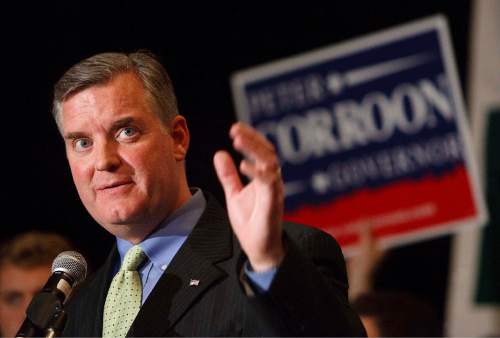This is an archived article that was published on sltrib.com in 2015, and information in the article may be outdated. It is provided only for personal research purposes and may not be reprinted.
Last year, the most hotly contested race at the state Democratic convention was for party chairman — won by former Salt Lake County Mayor Peter Corroon. He will be re-elected this year without breaking a sweat at the party's convention Saturday in Park City.
He's running unopposed.
"I stepped in halfway through [former chairman] Jim Dabakis' term, so it may be that people are willing to give me a full cycle as party chair," Corroon said, guessing why he has no opposition.
He also joked that it could be that "no one wanted the job or they were afraid to run against me."
Corroon says he plans to use the next two years to win back some legislative seats lost last year (Democrats hold only 17 seats in the 104-member Utah statehouse), build the party in each of the 29 counties, push voting by mail to improve voter turnout and work to improve Democrats' message about why Utahns should support the party.
"We haven't done a good job as Democrats of defining who we are and what we believe in, so our Republican friends have spent a lot of time telling people who we are," he said.
"I think most of the people of Utah share the values of the Democratic Party," which he said include "education, decent wages, health care for all Utahns, healthy air, and a decent environment to raise our families."
With no contest for chairman, the biggest issue at this Saturday's convention may be how and whether to change the way candidates may win the party's support to appear on primary election ballots.
That comes as a new law, SB54, will allow candidates to qualify for a primary either by gathering enough signatures or through a party's caucus-convention system, or both. Corroon said the party will consider three possible changes to qualifying through its conventions.
One resolution would allow anyone who earns 25 percent of a convention's delegate vote to appear on the primary ballot. Another would allow anyone who wins at least 70 percent of the convention vote to be the sole candidate qualified through the convention route — but that hopeful would still face others who collected enough signatures to make it to the primary. A third would use preferential voting, where convention delegates would list their first, second and third choice among candidates until one captured a majority of delegate votes. That person would clinch a primary spot or, if no petitioners made it to the ballot, the nomination.
Corroon said delegates to Saturday's convention could simply decide to stick with the current system, which allows the top two candidates to advance from a convention, unless one achieves 60 percent of the vote. That convention winner then would advance to the primary or general election.
"Our goal is to make it easier for people to get out of the convention so you have more people in a primary to give voters more options," Corroon said.
In the past, parties often sought to avoid primaries to save money for the general election. But Corroon said times have changed.
"We don't want political parties to be insular organizations that exclude the public. We want to make it easier for people to get on the ballot, and to give voters a greater choice."
The convention will also hold elections for other party offices. Candidates for vice chairwoman are Breanne Miller and Emily Bingham Hollingshead. Running for secretary are Ernie Gamonal and Marcus Stevenson. Candidates for treasurer are Zach Robinson and Celina Milner.



